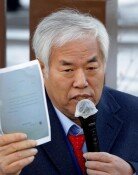No. of Emergency Welfare Fund Applicants Skyrockets
No. of Emergency Welfare Fund Applicants Skyrockets
Posted December. 09, 2008 07:45,
A 48-year-old man who used to run a small snack bar recently closed his business after being injured in a motorbike accident. Since he was blamed for the accident, he could not receive an insurance claim, and his wife was also unable to work while caring for him.
He applied for an emergency welfare fund and immediately received about two million won, including 700,000 won (482 U.S. dollars) for his livelihood and 1.3 million won (895 dollars) for medical treatment.
As the economic downturn deepens, a growing number of people are applying for the emergency welfare fund. But the budget has almost dried up, leaving the government agency responsible desperate to secure more funding.
The emergency welfare fund temporarily provides financial assistance to households suffering from financial hardship stemming from death, unemployment and missing family members.
Applicants can receive a livelihood welfare fund for up to four months of a maximum 1.27 million won (874 dollars). In addition, two payments for medical assistance is also available of up to three million won (2,066 dollars) each. Last year, 29,000 applicants benefited from this system.
The Health, Welfare and Family Affairs Ministry has set a budget of 37.8 billion won (26 million dollars) for this project. At the end of last month, however, 26,000 people applied for the funding, consuming up about 30 billion won (21 million dollars) or more than 80 percent of the budget. Given the economys nosedive in the second half of the year and with winter approaching, many experts warn that the remaining budget of 7.8 billion won (5.4 million dollars) will be insufficient this month.
An official at the welfare relief department of the Geumcheon Ward Office in Seoul said, Compared to the situation last year, the number of phone inquiries (for the program) has at least doubled and weve often received dozens of such calls a day this month.
By region, Busan has consumed 91.2 percent of its budget for welfare relief, followed by Ulsan (87.7 percent), Jeju Island (86.5 percent), Gwangju (85 percent), North Jeolla Province (83.9 percent) and Daegu (80.1 percent).
One Health Ministry official said, Well make an all-out effort to finance the emergency welfare fund this year, even if we have to advance next years budget or borrow money from other business projects.
The ministry is said to have allocated 48.9 billion won for the emergency welfare fund next year, up 30 percent from this years.
To apply for the fund, one should contact the welfare relief department of a municipality. An applicant should have a monthly income for a four-member family of under 1.9 million won (1,308 dollars), which is 150 percent of the minimum livelihood standard of 1.27 million won (874 dollars).
corekim@donga.com



![[속보]국힘 윤리위, 한동훈 제명 결정…장동혁호 ‘뺄셈 정치’ 가나](https://dimg.donga.com/c/138/175/90/1/wps/NEWS/IMAGE/2026/01/14/133151701.1.jpg)



